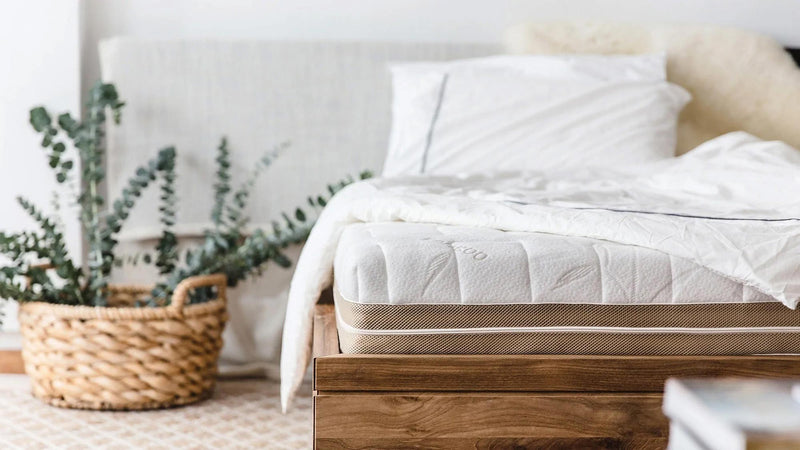While sustainable living should be on everyone’s radar, it doesn’t mean you have to become a radical tree-hugger and upend your life completely, of course. There are plenty of simple practices that you can adopt, right from the comfort of your home, which is where most of us are spending the majority of our time with the pandemic still not backing down. Here are three ways to promote sustainable living at home.
1. Use mattresses made of sustainable materials

According to research by the National Bed Federation, only a meagre 19% of mattresses get recycled in the UK. And the main reason for that is, they’re one of the hardest items to recycle. The lack of facilities contributes to the problem too, with the US having only 56 facilities to recycle the more than 18 million mattresses that are thrown away each year.
To avoid further clogging up the landfill, opt for more eco-friendly options such as Heveya®’s organic mattresses and bedding products. Since its inception, Heveya® has been part of the global fight against climate change. Designed with sustainability in mind, every mattress is made entirely out of natural latex, made from the sap of rubber trees. This means they’re recyclable and biodegradable. You can even give them a second life by shredding them and upcycling them into sound panels or seat cushions.
Going beyond the product itself, the process of production is made to be environmentally friendly as well. The plantation Heveya® works with, in particular, is carbon-neutral and Fair Choice certified. What’s more, Heveya® has partnered with Replant Corp to plant 12,000 trees in a year in the rainforest of Borneo, one of the world’s most important lungs. With Heveya®, you can save the world while you sleep.
2. Use less energy at home
It’s no question that people have been spending more time at home, since the start of the Covid-19 outbreak. You might be reading this article on your sofa, still unable to leave the house too often. Despite the situation, it doesn’t mean you have to resign to the fate of higher energy consumption and even higher utility bills.Here is a basic checklist of what you can do to live more sustainably:
- Turn off the lights when you leave the room. In certain conditions, you might not even need to turn on your lights in the first place, when you’ve got natural light pouring in from your windows during the day.
- Try to avoid relying on air-conditioning. We may be living near the Equator, but it’s no reason to blast the AC all day long. If you must, keep it to a single room and remember to keep the doors and windows closed so you’re not wasting extra energy. Another option is to use a fan instead. If you’re more committed to the sustainable life, try cracking open the windows and let the natural air outside cool you down.
- Don’t forget about your computer. Never leave your computer, or any device including your printer and scanner, running 24/7. Even when it’s in sleep mode, your computer is consuming power. According to CNET Labs, an idle desktop uses about 100 watts, whereas a busy one uses 145 watts, which isn’t that great of a difference.
3. Aim for zero waste

This includes both food and material waste. Switch to eco-friendly alternatives and eliminate single-use products such as plastic bags, plastic bottles, disposable utensils – everything responsible for polluting our oceans and killing the wildlife that our planet needs to survive.
Bring sustainable living to the next level by striving for zero food waste too. Well, this might be a bit of a stretch, but at the very least, you should be rethinking your leftovers. Instead of binning food left, right and centre, look for recipes that allow you to maximise every ingredient. This is an opportunity for you to use your imagination and flex your culinary skills. The rest can be composted.
To go even further, why not try growing your own fruits and herbs? Your homegrown food, unlike those at the supermarket, won’t come with plastic packaging – a huge plus for the environment and your pocket. You can also be sure that your food is pesticide-free. Here’s another not-so-fun fact: To transport produce to the supermarket, a ton of fossil fuels has to be used. Growing your own produce prevents that from happening.
If you don’t see yourself becoming a part-time urban farmer, don’t fret. You can still champion the values of sustainable, eco-friendly living by bringing your own reusable bag - like the Heveya® bag that you’ll receive when you buy our sheets and pillows - to the grocery store.
Live your life to the greenest
They say if you want to make an impact on the world, you should start with your local community. We say, why not start with your own home first, where you can effect change in the easiest, most direct way? Baby steps will eventually lead to giant strides.Strive for sustainable living at home with these tips, and give our planet another shot to thrive.














